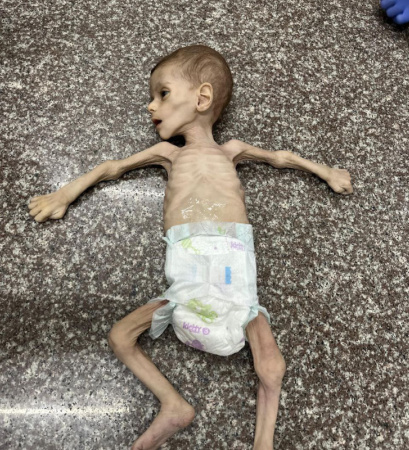
New York – Saba:
United Nations humanitarian agencies have warned that the Gaza Strip is on the brink of famine, based on the latest data from the Integrated Food Security Phase Classification (IPC).
According to the agencies, 96% of households surveyed during the first two weeks of July experienced moderate to severe levels of water insecurity—an increase of 3% compared to June.
This came in the latest humanitarian update on the situation in Gaza, released Thursday.
The United Nations Relief and Works Agency for Palestine Refugees (UNRWA) affirmed that the famine in Gaza is entirely man-made.
UNRWA emphasized the urgent need to allow UN agencies, including itself, to carry out their work so that aid can safely reach those in desperate need—including one million hungry children.
Juliette Touma, Director of Communications at UNRWA, stressed that delivering aid by land routes is the safest and most dignified method.
She noted that during the previous ceasefire earlier this year, the UN, including UNRWA, was able to bring in between 500 and 600 trucks of aid per day.
Meanwhile, the UN Office for the Coordination of Humanitarian Affairs (OCHA) reported that Israeli forces continued their intense air, land, and sea bombardment of Gaza over the past week, alongside ongoing ground operations.
According to medical sources, 640 Palestinians were killed and 3,224 injured between July 23 and 30. Since October 7, the total death toll has reached at least 60,138, with 146,269 injured.
Since the start of the aggression on Gaza, the World Health Organization (WHO) reported that 7,460 patients and wounded individuals—among them 5,160 children—have been evacuated from the Strip for treatment abroad.
United Nations humanitarian agencies have warned that the Gaza Strip is on the brink of famine, based on the latest data from the Integrated Food Security Phase Classification (IPC).
According to the agencies, 96% of households surveyed during the first two weeks of July experienced moderate to severe levels of water insecurity—an increase of 3% compared to June.
This came in the latest humanitarian update on the situation in Gaza, released Thursday.
The United Nations Relief and Works Agency for Palestine Refugees (UNRWA) affirmed that the famine in Gaza is entirely man-made.
UNRWA emphasized the urgent need to allow UN agencies, including itself, to carry out their work so that aid can safely reach those in desperate need—including one million hungry children.
Juliette Touma, Director of Communications at UNRWA, stressed that delivering aid by land routes is the safest and most dignified method.
She noted that during the previous ceasefire earlier this year, the UN, including UNRWA, was able to bring in between 500 and 600 trucks of aid per day.
Meanwhile, the UN Office for the Coordination of Humanitarian Affairs (OCHA) reported that Israeli forces continued their intense air, land, and sea bombardment of Gaza over the past week, alongside ongoing ground operations.
According to medical sources, 640 Palestinians were killed and 3,224 injured between July 23 and 30. Since October 7, the total death toll has reached at least 60,138, with 146,269 injured.
Since the start of the aggression on Gaza, the World Health Organization (WHO) reported that 7,460 patients and wounded individuals—among them 5,160 children—have been evacuated from the Strip for treatment abroad.